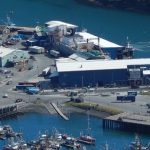It is no denying fact that the prices of frozen seafood is increasing in Japan as the consumers are choosing frozen seafood over fresh ones. The retailers and foodservice firms are seeking more durable food in the aftermath of the earthquake. Wholesale prices of frozen seafood are rising as retailers and foodservice companies are increasing procurement of more durable frozen food while demand for fresh fish is shrinking in the aftermath of the eastern Japan mega quake in March.
According to the information the prices of frozen common squid and coho salmon are now about 10 percent higher than in the period before the natural disaster. The prices of salted and dried processed products are also on an upturn. At Tokyo’s Tsukiji Fish Market, the prices of domestically-produced frozen flying squid climbed to a high of Y420 per kilo on May 10, which was 14 percent higher than March 10 prior to the earthquake.
The recent rise in the prices of frozen seafood presented a clear contrast with 70 percent drop to Y473 per kilo for sand lance from which radioactive substances were detected in the area off Ibaraki, east of Tokyo. Retailers and foodservice firms are now facing declines of customers as the mood for restraining from banquets and corporate entertainment is spreading. The authority has speculation that the recent trend might push the prices of frozen seafood to rise further during the summer.








